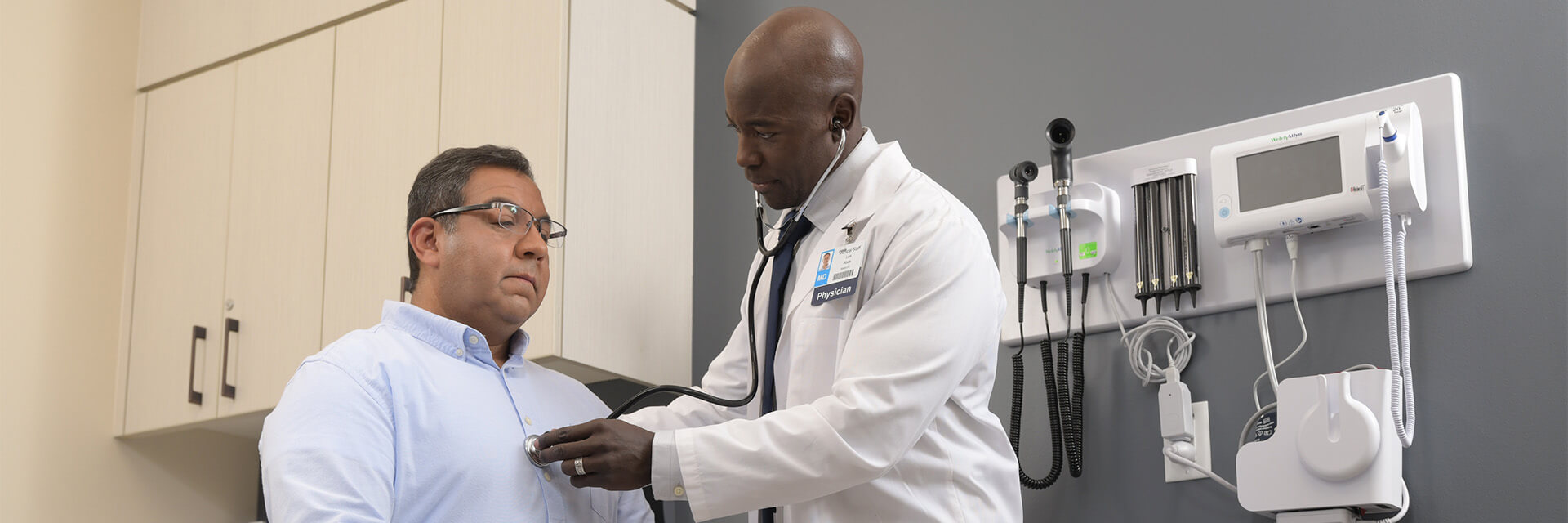When you come down with a nasty cold or experience aches and pains that you just can’t shake, you can count on your primary care physician to be there for you. But did you know your primary care physician can also care for your heart health? We spoke to Anagha Agarwal, M.D., an internist and physician on the medical staff at Texas Health Plano and at Texas Health Internal Medicine, a Texas Health Physicians Group practice, to learn how your PCP can help with your heart health.
A primary care provider can determine your risk of cardiovascular disease through a routine exam — making those annual exams evermore important — and recommend lifestyle changes, medications and even refer you to a cardiologist if needed. It all starts with the simplest of tests: your blood pressure and heart rate.
“They always check your blood pressure and your heart rate because those are very important yet simple diagnostic tests for your heart health,” Agarwal explains. “But those are only a small peephole into how your heart is doing. In addition, they listen to your heart and lungs and may even check if you have swollen feet while they examine you. Although not always obvious, when you put it all together, they are caring for your heart health.”
Other tests primary care doctors may perform include:
- A blood test to check for cholesterol. Your risk of heart disease goes up if your total cholesterol count is over 200, HDL (good) is under 40, LD (“bad”) is over 120, and triglycerides are over 150.
- A blood test to check for diabetes. This test is called hemoglobin A1c and it determines your average blood glucose levels over the past two to three months.
- An electrocardiogram (EKG). This test measures the electrical activity of the heartbeat.
Next up, your doctor will most likely ask how you’re feeling and if you’ve experienced any changes since your last visit. If it’s your first visit, or it’s been a while, he or she will ask about your lifestyle and medical history. This includes behaviors such as smoking, drug or alcohol use, physical activity, dietary habits, plus any family history of heart disease or diabetes.
While it may seem innocent to embellish a bit here and there, Agarwal says it’s important to answer honestly and with as much detail as possible. Your physician is here to listen and help you get on the right track, not to judge.
“We are looking for identifiers for your risk of heart conditions such as heart disease and coronary artery disease, among other things,” she says. “I often hear from patients that they think their heart is OK, they’re just getting ‘too old’ to walk up the stairs or do less running than they used to do. That’s a misconception.”
The following are common questions Agarwal asks patients related to their heart health:
- “Are you able to do all of the work you did before the same way or do you get tired?”
- “Can you walk a block without getting out of breath?”
- “Can you climb a flight of stairs without getting short-winded?”
- “Do you feel your heart is racing and sometimes skips a beat?”
- “Do you get light-headed or dizzy when you exercise/exert yourself?”
Once your doctor has a quick snapshot of your heart health, he or she can discuss treatment or address any concerns. If needed, your doctor can prescribe medications to help lower high blood pressure or cholesterol. Depending on your lab and test results, your doctor may also refer you to a cardiologist to perform a stress test and echocardiogram to get more insight into your heart health. But many patients can make simple changes with the help of their primary care doctor, and according to the American Heart Association (AHA), even small changes can help lower your heart disease risk by 80 percent.
Here’s what you can do to help lower your risk:
- Manage stress: Exercise, meditate, talk to friends or a therapist, spend time on hobbies, etc. Everyone has a different way of dealing with stress, so find what works for you.
- Eat a balanced diet low in cholesterol, saturated fat, salt and refined sugars and high in fiber, vitamins and minerals to maintain healthy cholesterol and blood pressure, weight, etc.
- Quit smoking. Smoking doubles your heart attack risk and makes it more likely you’ll die if you do suffer cardiac arrest.
- Get active! The AHA recommends at least 150 minutes per week of moderate-intensity aerobic exercise or 75 minutes per week of rigorous aerobic activity spread throughout the week. Texas Health has nine fitness centers open to the public and staffed with knowledgeable experts to help coach you every step of the way.
While heart disease is a scary subject, taking care of your heart doesn’t have to be daunting. Your primary care provider can help manage any risk factors and help you meet your goals.
“Prevention is better than trying to cure,” Agarwal says. “Hesitation only leads to stress. Even if everything turns out just fine, we want those tests to come back normal to help us rest assured that we are heart-healthy!”
Has it been a while since you’ve had your annual physical and checked your blood pressure? Finding a physician who can partner with you for your health is essential. We can help find a physician that’s appropriate and convenient for you. Call 1-877-THR-WELL (877-847-9355) or visit TexasHealth.org/FindaProvider today.

